2013人教版六年级下册英语复习提纲
六年级下册英语人教版重点词汇复习资料
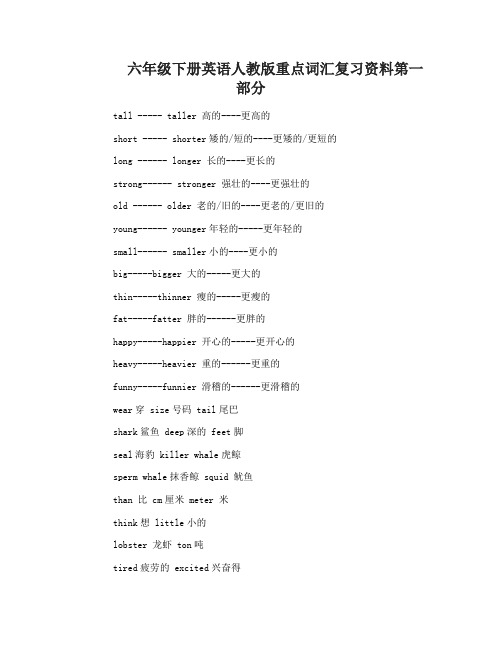
六年级下册英语人教版重点词汇复习资料第一部分tall ----- taller 高的----更高的short ----- shorter矮的/短的----更矮的/更短的long ------ longer 长的----更长的strong------ stronger 强壮的----更强壮的old ------ older 老的/旧的----更老的/更旧的young------ younger年轻的-----更年轻的small------ smaller小的----更小的big-----bigger 大的-----更大的thin-----thinner 瘦的-----更瘦的fat-----fatter 胖的------更胖的happy-----happier 开心的-----更开心的heavy-----heavier 重的------更重的funny-----funnier 滑稽的------更滑稽的wear穿 size号码 tail尾巴shark鲨鱼 deep深的 feet脚seal海豹 killer whale虎鲸sperm whale抹香鲸 squid 鱿鱼than 比 cm厘米 meter 米think想 little小的lobster 龙虾 ton吨tired疲劳的 excited兴奋得angry生气的 sad悲伤的happy高兴得 sore疼得hurt疼痛 bored无聊的feel感觉 sick有病的nose鼻子 know知道worry担心 medicine药drink喝 stay逗留better更好的 soon立刻;不久trip旅行 fail失败have a fever发烧 pass传递have a cold感冒have a sore throat喉咙痛have a toothache牙痛have a headache头痛六年级下册英语人教版重点词汇复习资料第二部分watch ( watched ) 看wash ( washed) 洗clean ( cleaned ) 打扫play (played ) 玩visit (visited)看望do/did 助动词/做cook (cooked ) 做饭go( went ) 去study ( studied ) 学习read ( read ) 阅读fly ( flew ) 飞yesterday ( 昨天)swim (swam) 游泳last 上一个weekend 周末to 朝 ,向park 公园go swimming ( went swimming ) 去游泳go fishing ( went fishing )去钓鱼go hiking ( went hiking ) 去郊游return ( returned) 送回/归还sing sang 唱 eat ate吃go went去 leave left离开take took 拍;照 have had有;吃buy bought买 see saw看见prepare准备 relax放松get got到达go/went ice-skating 去滑冰cousin 堂兄弟;堂姐妹工作I’ll= I will miss想念buy/bought presents 买礼物row/rowed a boat 划船see/saw elephants 看大象go/went skiing 去滑雪learn / learned Chinese学中文take /took pictures 拍照climb/climbed a mountain 爬山sing and dance /sang and danced 唱歌跳舞。
六年级下册英语复习提纲
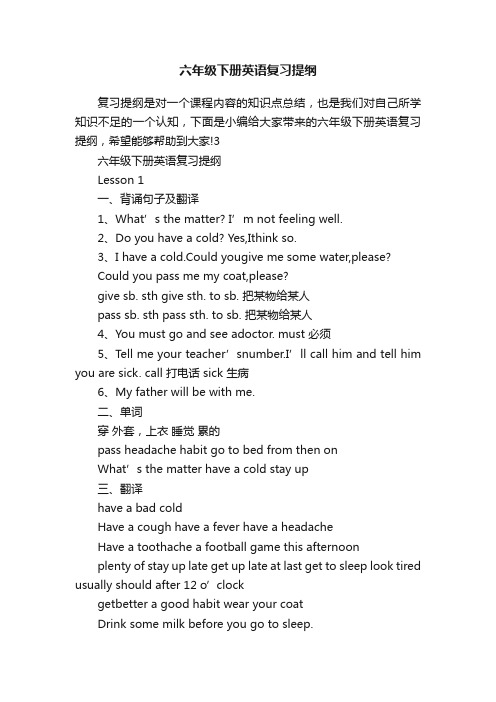
六年级下册英语复习提纲复习提纲是对一个课程内容的知识点总结,也是我们对自己所学知识不足的一个认知,下面是小编给大家带来的六年级下册英语复习提纲,希望能够帮助到大家!3六年级下册英语复习提纲Lesson 1一、背诵句子及翻译1、What’s the matter? I’m not feeling well.2、Do you have a cold? Yes,Ithink so.3、I have a cold.Could yougive me some water,please?Could you pass me my coat,please?give sb. sth give sth. to sb. 把某物给某人pass sb. sth pass sth. to sb. 把某物给某人4、You must go and see adoctor. must 必须5、Tell me your teacher’snumber.I’ll call h im and tell him you are sick. call 打电话 sick 生病6、My father will be with me.二、单词穿外套,上衣睡觉累的pass headache habit go to bed from then onWhat’s the matter have a cold stay up三、翻译have a bad coldHave a cough have a fever have a headacheHave a toothache a football game this afternoonplenty of stay up late get up late at last get to sleep look tired usually should after 12 o’clockgetbetter a good habit wear your coatDrink some milk before you go to sleep.I’m sure you will sleep well and get better soon.It’s a good habit to go to bed early and get up early.Lesson 2一、背诵句子及翻译1、What do you usually do onSunday afternoon? I often play basketball.2、Did you play basketballyesterday?No,I didn’t.I went to visit a friend.3、My friend likes takingphotos. He showed me many photos.二、单词参观,探望照片生气的高的once trip build take photos三、翻译have a good time visit a friend playbasketball wash my clothes watch TV work late wet kind came back a long trip the giant’s garden sad winter summer look out again come out pull downWas it you first trip to London? Yes,it was.Was the weather good?No,it wasn’t.One day the giant came back after a long trip.He saw the children playing in his garden. see sb. doing sth 看见某人正在做某事He was very angry.He built a high wall around thegarden.There were no birds or flowers,and the trees were notgreen.Lesson 3一、背诵句子及翻译1、Did you stay at home lastSunday?No I went to the zoo.2、How many tigers werethere?There were about ninety. how many +名词复数3、Did you see many ofthem?Yes, we did.4、We were in a bus,and wecould drive very near and have a good look at them.5、Do the tigers live a goodlife in the zoo?6、So people are doing theirbest to protect them. do one’s best todo sth. 尽某人最大努力做某事二、单词小船,划船动物园 last life protect mine middle off world have a g ood look at do one’sbest wait for in the middle of after some time三、翻译do my best dohis best do her best do your best do our best go swimming go boating go fishing go shopping do their best What fun! near stay at home go to the zoowalk to school ride a bike draw somepictures read a book write a letter buy some fruit buy some vegetables walk off the road below allin theworld The summer holiday is over. One day I was driving my car along the road.I got out of my car to have a look.There were about ten cars in front of mine.I saw a mother koala with a baby on her back. with sth. on one’s back 背上背着She want to cross the road,but she just sat down inthe middle of the road.The cars started to go again.Lesson 4一、背诵句子及翻译1、What did you do lastSaturday? I went to the supermarket.2、Who took you there?Myuncle.3、How did you go there?Wewent by taxi.4、It looks nice on you.二、单词超市出租汽车毛衣凉快的,酷年轻的衣服 poor dead quickly lose try on put on三、翻译take bybus by bike by car by taxi see a film make a cake fly a kite do my homework talk about go to the library visit a farm milk a cow ride a horse July poor be bad to be good to have a party find a wife take her daughters to the partyhave to stay at home just then come up turn sth. into 把----变成--- come back before must all evening soon run out quickly on thewaytry sth.on put sth. on happily ever afterShe made her do all the hard work. make sb. do sth. 让某人做某事On the way she lost one of her glass shoes.They asked all the girls to try the shoe on,but onlyCinderella could put it on. ask sb. To do sth. 让某人做某事Lesson 5一、背诵句子及翻译1、You should go to see adoctor.2、Don’t worry about yourlessons.I’ll help you.3、What was the dateyesterday?It was may 1st.4、Becau se it rained suddenlyand we didn’t have umbrellas.We all get wet.What bad luck!二.单词和翻译穿外套,上衣睡觉累的参观,探望照片生气的高的小船,划船动物园超市出租汽车毛衣凉快的,酷年轻的衣服雨伞 poor dead quickly lose try on put on last life protect mine middle off worldhave a good look at do on e’sbest wait for in the middle of after some time take photos headache go to bed from then on What’s the matter have a cold stay upluck five days ago play games a hot dog in his hand on the ground三、课本27-31页,68页词组、70-72页内容会背六年级英语知识要点及重点句型第一课:短语:look at看in the middle在中间 talk with 谈论、讨论 in the world在世界上infront of 在….前面go out去外面 look for寻找 climb up爬上 get down 下来goon 继续语法:形容词和副词的比较级和最高级的用法和变化规则1、用法技巧:当句子里出现单词than(比什么更……)用比较级,(二者比较)当句子里出现单词in ,of时用最高级(大于等于3者)。
【人教版】小学英语六年级下册知识点总结
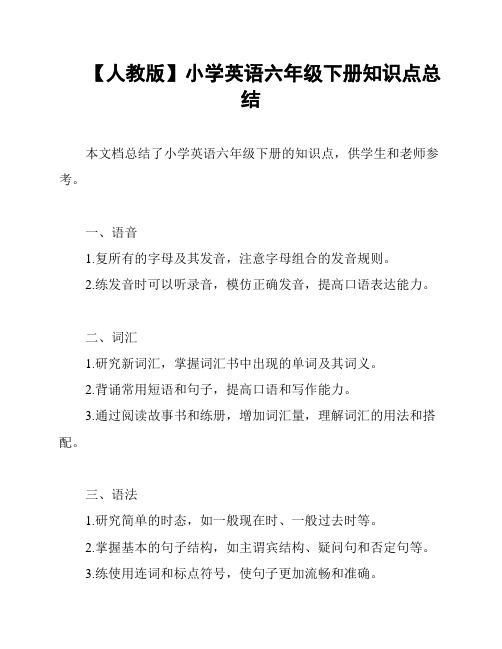
【人教版】小学英语六年级下册知识点总
结
本文档总结了小学英语六年级下册的知识点,供学生和老师参考。
一、语音
1.复所有的字母及其发音,注意字母组合的发音规则。
2.练发音时可以听录音,模仿正确发音,提高口语表达能力。
二、词汇
1.研究新词汇,掌握词汇书中出现的单词及其词义。
2.背诵常用短语和句子,提高口语和写作能力。
3.通过阅读故事书和练册,增加词汇量,理解词汇的用法和搭配。
三、语法
1.研究简单的时态,如一般现在时、一般过去时等。
2.掌握基本的句子结构,如主谓宾结构、疑问句和否定句等。
3.练使用连词和标点符号,使句子更加流畅和准确。
四、听力
1.听力是英语研究中的重要一环,要通过多听多说来提高听力理解能力。
2.可以通过听录音、看视频等方式进行听力训练,提高对英语语音和语调的敏感度。
五、口语
1.多与他人进行英语口语交流,增加口语表达的机会。
2.可以通过角色扮演、小组讨论等方式进行口语训练,提高口语流利度和自信心。
六、阅读
1.多读英语故事书、文章等,提高阅读能力和理解能力。
2.阅读时注意理解词汇和句子的意思,培养阅读思维和逻辑思维。
3.可以进行课外阅读,拓宽阅读领域,增加对不同题材的文本理解。
七、写作
1.多进行英语书面表达,提高写作能力和语法运用能力。
2.写作时注意语法规范、词汇的选择和句子的连贯性。
以上是小学英语六年级下册的知识点总结,希望对学生和老师有所帮助。
人教版六年级英语下册基础知识要点
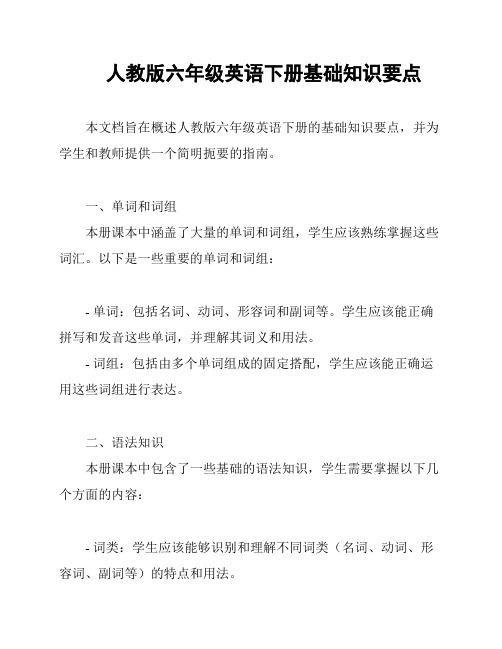
人教版六年级英语下册基础知识要点本文档旨在概述人教版六年级英语下册的基础知识要点,并为学生和教师提供一个简明扼要的指南。
一、单词和词组本册课本中涵盖了大量的单词和词组,学生应该熟练掌握这些词汇。
以下是一些重要的单词和词组:- 单词:包括名词、动词、形容词和副词等。
学生应该能正确拼写和发音这些单词,并理解其词义和用法。
- 词组:包括由多个单词组成的固定搭配,学生应该能正确运用这些词组进行表达。
二、语法知识本册课本中包含了一些基础的语法知识,学生需要掌握以下几个方面的内容:- 词类:学生应该能够识别和理解不同词类(名词、动词、形容词、副词等)的特点和用法。
- 句型:学生应该能够理解和运用一些基础的句型结构,如主语+谓语、主语+谓语+宾语等。
三、听力和口语听力和口语是语言研究中重要的方面。
学生需要通过听力练和口语训练来提高自己的听力和口语能力。
以下是一些学生可以进行的活动:- 听力练:学生可以听录音材料,理解其中的对话和内容,并进行相关练。
- 口语对话:学生可以通过与同学或教师进行对话,提高自己的口语表达能力。
四、阅读和写作阅读和写作是研究英语的重要环节。
学生需要通过阅读文章和写作练来提高自己的阅读和写作水平。
以下是一些建议:- 阅读文章:学生可以选择适合自己水平的英语文章进行阅读,了解文章的内容和结构,并进行相关阅读理解练。
- 写作练:学生可以通过写作练来提高自己的写作能力,如写日记、作文等。
五、其他要点除了以上内容外,学生还应该注意以下几个要点:- 研究方法:学生应该根据自身情况选择适合自己的研究方法,如多听多说、多读多写等。
- 复和总结:学生应该及时复所学内容,并进行总结和归纳,以便更好地掌握知识。
总结:本文档概述了人教版六年级英语下册的基础知识要点,包括单词和词组、语法知识、听力和口语、阅读和写作等。
学生和教师可以根据这些要点进行相关学习和教学活动,以提高学生的英语水平。
人教版小学六年级下册英语课文复习资料全册
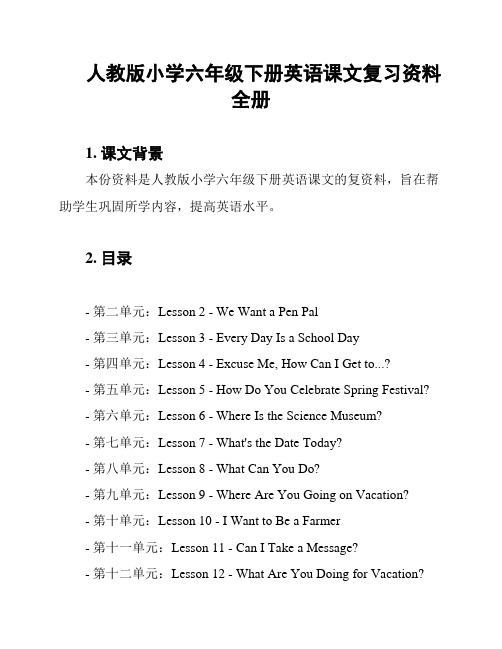
人教版小学六年级下册英语课文复习资料全册1. 课文背景本份资料是人教版小学六年级下册英语课文的复资料,旨在帮助学生巩固所学内容,提高英语水平。
2. 目录- 第二单元:Lesson 2 - We Want a Pen Pal- 第三单元:Lesson 3 - Every Day Is a School Day- 第四单元:Lesson 4 - Excuse Me, How Can I Get to...?- 第五单元:Lesson 5 - How Do You Celebrate Spring Festival?- 第六单元:Lesson 6 - Where Is the Science Museum?- 第七单元:Lesson 7 - What's the Date Today?- 第八单元:Lesson 8 - What Can You Do?- 第九单元:Lesson 9 - Where Are You Going on Vacation?- 第十单元:Lesson 10 - I Want to Be a Farmer- 第十一单元:Lesson 11 - Can I Take a Message?- 第十二单元:Lesson 12 - What Are You Doing for Vacation?- 第十三单元:Lesson 13 - Give Me Some Advice, Please- 第十四单元:Lesson 14 - What Do You Want to Be in the Future?- 第十五单元:Lesson 15 - Travelling Around the World3. 使用说明学生可根据自己的研究进度选择相应的单元进行复。
每个单元包含一个课文的标题,通过阅读课文并进行练,学生可以巩固词汇、句型和语法等方面的知识。
4. 复方法为了有效地进行复,建议学生采取以下策略:- 阅读课文:仔细阅读每个课文,理解内容和语法结构。
英语复习提纲下
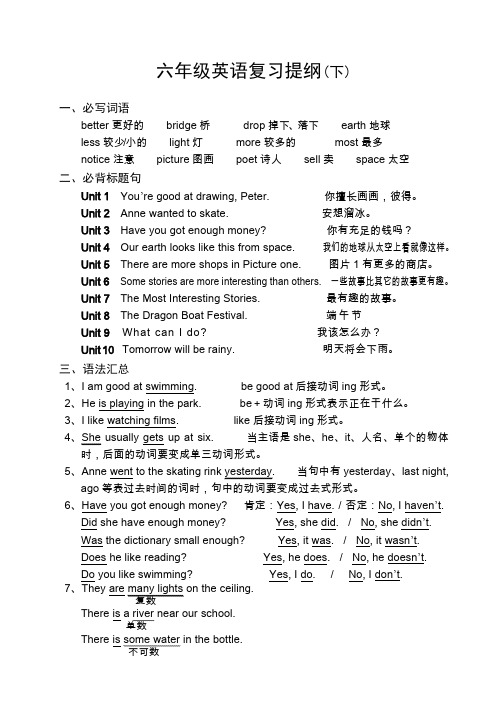
六年级英语复习提纲(下)一、必写词语better更好的bridge桥drop掉下、落下earth地球less较少/小的light灯more较多的most最多notice注意picture图画poet诗人sell卖space太空二、必背标题句Unit 1You’re good at drawing, Peter. 你擅长画画,彼得。
Unit 2Anne wanted to skate. 安想溜冰。
Unit 3Have you got enough money? 你有充足的钱吗?Unit 4Our earth looks like this from space. 我们的地球从太空上看就像这样。
Unit 5There are more shops in Picture one. 图片1有更多的商店。
Unit 6Some stories are more interesting than others.一些故事比其它的故事更有趣。
Unit 7The Most Interesting Stories. 最有趣的故事。
Unit 8The Dragon Boat Festival. 端午节Unit 9What can I do? 我该怎么办?Unit10Tomorrow will be rainy. 明天将会下雨。
三、语法汇总1、I am good at swimming. be good at后接动词ing形式。
2、He is playing in the park. be+动词ing形式表示正在干什么。
3、I like watching films. like后接动词ing形式。
4、She usually gets up at six. 当主语是she、he、it、人名、单个的物体时,后面的动词要变成单三动词形式。
5、Anne went to the skating rink yesterday. 当句中有yesterday、last night,ago等表过去时间的词时,句中的动词要变成过去式形式。
小学六年级英语下册期末复习提纲

小学六年级英语下册期末复习提纲1. 词汇复- 复并掌握本学期所学的所有单词,包括拼写、读音和词义。
2. 语法复- 复句子结构,包括主语、谓语、宾语、定语和状语的用法。
- 复时态的使用,包括一般现在时、一般过去时和一般将来时。
- 复形容词和副词的比较级和最高级的构成和用法。
3. 句型练- 复肯定句、否定句、疑问句的构成和回答方式。
- 复一般疑问句和特殊疑问句的语序和构成。
4. 阅读理解- 阅读并理解本学期所学的故事和文章,回答相关问题。
- 提高阅读速度和理解能力,注重理解文章的主题、细节和推理。
5. 写作练- 练书写正确的英文字母和单词,注意大小写和造句的准确性。
- 练写短文,表达自己的观点、描述人物和事件等。
6. 口语训练- 练口语表达,包括日常交流用语、询问和回答问题等。
- 练听说对话,提高听力和口语理解能力。
7. 朗读练- 练正确的发音和语调,提升朗读表达能力。
- 练流利朗读短文和故事,注意语音语调和语速。
8. 听力训练- 练听力理解,包括听单词、短语和句子等的听写和理解。
- 练听懂故事、对话和问题等,提高听力技巧和反应能力。
9. 语言运用- 综合运用所学语言知识,进行口语和书面的实际应用练。
- 练解决实际的交际问题,如购物、旅行、问路等。
10. 自主研究- 建立良好的研究惯,自主复所学知识。
- 多做练题,查漏补缺,积累知识。
以上是小学六年级英语下册期末复习的提纲,按照提纲进行有针对性的复习,相信你会取得好成绩!加油!。
人教版六年级下册英语知识点
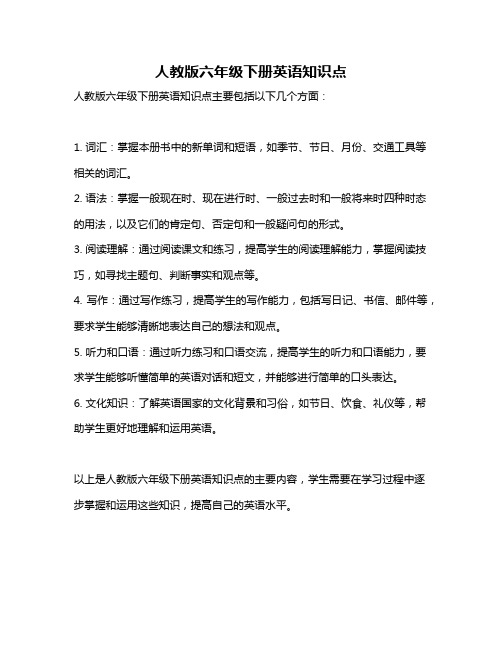
人教版六年级下册英语知识点
人教版六年级下册英语知识点主要包括以下几个方面:
1. 词汇:掌握本册书中的新单词和短语,如季节、节日、月份、交通工具等相关的词汇。
2. 语法:掌握一般现在时、现在进行时、一般过去时和一般将来时四种时态的用法,以及它们的肯定句、否定句和一般疑问句的形式。
3. 阅读理解:通过阅读课文和练习,提高学生的阅读理解能力,掌握阅读技巧,如寻找主题句、判断事实和观点等。
4. 写作:通过写作练习,提高学生的写作能力,包括写日记、书信、邮件等,要求学生能够清晰地表达自己的想法和观点。
5. 听力和口语:通过听力练习和口语交流,提高学生的听力和口语能力,要求学生能够听懂简单的英语对话和短文,并能够进行简单的口头表达。
6. 文化知识:了解英语国家的文化背景和习俗,如节日、饮食、礼仪等,帮助学生更好地理解和运用英语。
以上是人教版六年级下册英语知识点的主要内容,学生需要在学习过程中逐步掌握和运用这些知识,提高自己的英语水平。
人教版六年级英语下册知识点梳理完整版

人教版六年级英语下册知识点梳理HEN system office room 【HEN16H-HENS2AHENS8Q8-HENH1688】六年级英语下册知识点梳理Unit 1 How tall are you?一、单元内容简析:本单元内容的中心话题是询问人或事物的年龄、身高、重量以及长度并作比较。
内容涉及恐龙、猴子以及鲸类的比较,学生之间在年龄、身高和体重方面的比较。
1、数字的读法,含有“厘米、千克”单位的读法。
如百以上164:one hundred and sixty-four,学生可能读的时候百后不知加“and”,还有千的读法:thousand,小数的读法等。
2、形容词比较级的用法与变化形式,哪些要双写,哪些要把y变i成再加er,到底在什么情况下变比较级要加上more。
3、代词的用法,特别是名词性物主代词的用法。
四、易考点与易错点:1、词语类:①四会词语在听力部分听写或笔试部分按照汉意写词语。
②按要求写词语:变比较级funny,heavy,big,thin;long的名词,foot,tooth复数,heavy(heavier)的反义词light(er)③very修饰原级,much修饰比较级。
例如:He is very tall. He is much taller than you.2、语法、句型类:①How引导的不同特殊疑问句:How be sb.(问某人状况),How tall/heavy/old be sb./sth(询问身高、体重、年龄)How long/big/large be---(问多长、多大)How many/much(问数量、价格)。
②比较级的运用,一定要是相同内容或类别才可以进行比较,这是学生最易出错和混淆娥地方。
例如:Mike’s legs are longer than (John),如果学生翻译会直接填写John,但是一分析就不难发现应该和John的腿作比较的,所以应该是John’s。
人教版六年级英语下册全册要点总结复习资料
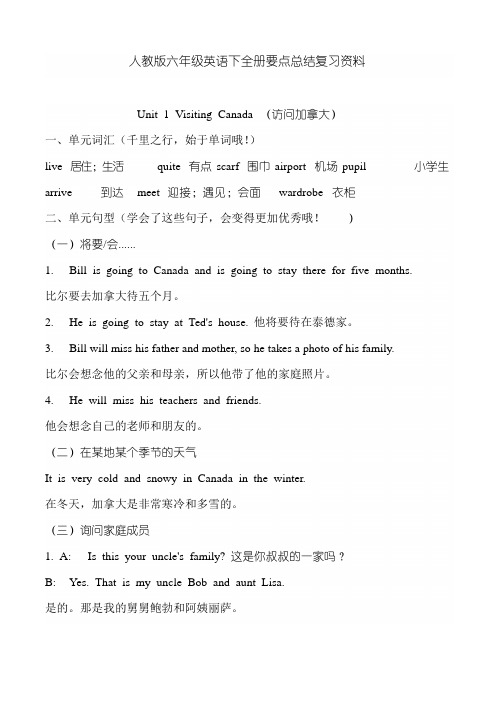
人教版六年级英语下全册要点总结复习资料Unit1Visiting Canada(访问加拿大)一、单元词汇(千里之行,始于单词哦!)live居住;生活quite有点scarf围巾airport机场pupil小学生arrive到达meet迎接;遇见;会面wardrobe衣柜二、单元句型(学会了这些句子,会变得更加优秀哦!)(一)将要/会......1.Bill is going to Canada and is going to stay there for five months.比尔要去加拿大待五个月。
2.He is going to stay at Ted's house.他将要待在泰德家。
3.Bill will miss his father and mother,so he takes a photo of his family.比尔会想念他的父亲和母亲,所以他带了他的家庭照片。
4.He will miss his teachers and friends.他会想念自己的老师和朋友的。
(二)在某地某个季节的天气It is very cold and snowy in Canada in the winter.在冬天,加拿大是非常寒冷和多雪的。
(三)询问家庭成员1.A:Is this your uncle's family?这是你叔叔的一家吗?B:Yes.That is my uncle Bob and aunt Lisa.是的。
那是我的舅舅鲍勃和阿姨丽萨。
2.A:Who is that girl?那个女孩是谁?B:That's Jenny,my cousin.那是珍妮,我的表妹。
3.A:Who are the people in this photo?这张照片里的人是谁?B:They are my grandparents.他们是我的祖父母。
(四)职业1.My uncle is a famous artist.我的叔叔是一位著名的艺术家。
2013人教版六年级下册英语复习提纲
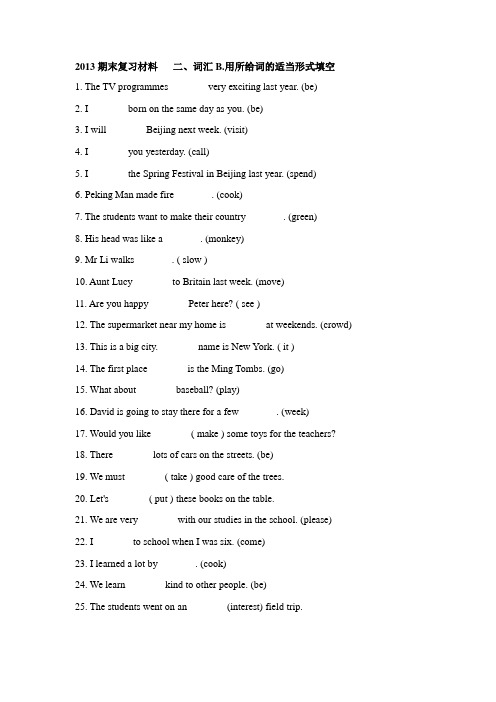
2013期末复习材料二、词汇B.用所给词的适当形式填空1. The TV programmes _______ very exciting last year. (be)2. I _______ born on the same day as you. (be)3. I will _______ Beijing next week. (visit)4. I _______ you yesterday. (call)5. I _______ the Spring Festival in Beijing last year. (spend)6. Peking Man made fire _______. (cook)7. The students want to make their country _______. (green)8. His head was like a _______. (monkey)9. Mr Li walks _______. ( slow )10. Aunt Lucy _______ to Britain last week. (move)11. Are you happy _______ Peter here? ( see )12. The supermarket near my home is _______ at weekends. (crowd)13. This is a big city. _______ name is New York. ( it )14. The first place _______ is the Ming Tombs. (go)15. What about _______ baseball? (play)16. David is going to stay there for a few _______. (week)17. Would you like _______ ( make ) some toys for the teachers?18. There _______ lots of cars on the streets. (be)19. We must _______ ( take ) good care of the trees.20. Let's _______ ( put ) these books on the table.21. We are very _______ with our studies in the school. (please)22. I _______ to school when I was six. (come)23. I learned a lot by _______. (cook)24. We learn _______ kind to other people. (be)25. The students went on an _______ (interest) field trip.。
2013版人教版六年级下册英语知识点
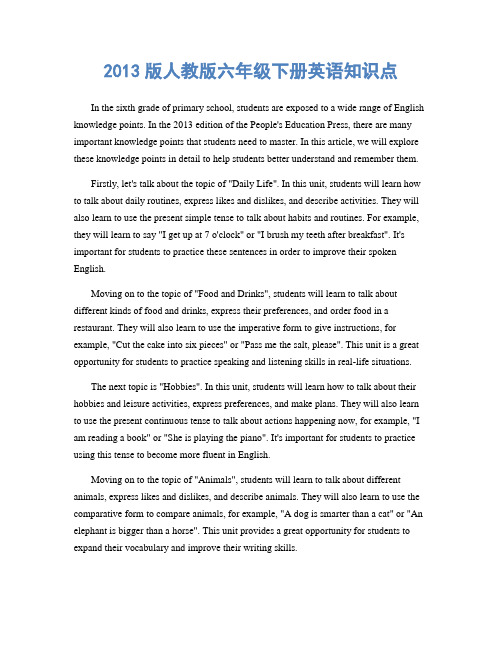
2013版人教版六年级下册英语知识点In the sixth grade of primary school, students are exposed to a wide range of English knowledge points. In the 2013 edition of the People's Education Press, there are many important knowledge points that students need to master. In this article, we will explore these knowledge points in detail to help students better understand and remember them.Firstly, let's talk about the topic of "Daily Life". In this unit, students will learn how to talk about daily routines, express likes and dislikes, and describe activities. They will also learn to use the present simple tense to talk about habits and routines. For example, they will learn to say "I get up at 7 o'clock" or "I brush my teeth after breakfast". It's important for students to practice these sentences in order to improve their spoken English.Moving on to the topic of "Food and Drinks", students will learn to talk about different kinds of food and drinks, express their preferences, and order food in a restaurant. They will also learn to use the imperative form to give instructions, for example, "Cut the cake into six pieces" or "Pass me the salt, please". This unit is a great opportunity for students to practice speaking and listening skills in real-life situations.The next topic is "Hobbies". In this unit, students will learn how to talk about their hobbies and leisure activities, express preferences, and make plans. They will also learn to use the present continuous tense to talk about actions happening now, for example, "I am reading a book" or "She is playing the piano". It's important for students to practice using this tense to become more fluent in English.Moving on to the topic of "Animals", students will learn to talk about different animals, express likes and dislikes, and describe animals. They will also learn to use the comparative form to compare animals, for example, "A dog is smarter than a cat" or "An elephant is bigger than a horse". This unit provides a great opportunity for students to expand their vocabulary and improve their writing skills.The final topic we will discuss is "Travel". In this unit, students will learn how to talk about different means of transportation, express preferences, and make travel plans. They will also learn to use the future tense to talk about future plans and intentions, for example, "I will go to Beijing next week" or "They are going to visit the Great Wall". It's important for students to practice using the future tense to become more confident in speaking English.In conclusion, the 2013 edition of the People's Education Press for the sixth grade English curriculum covers a wide range of knowledge points, including daily life, food and drinks, hobbies, animals, and travel. It's important for students to practice speaking, listening, reading, and writing in order to master these knowledge points. With consistent practice and hard work, students can improve their English skills and become more confident in using the language.。
(完整版)小学六年级人教版英语总复习及知识点
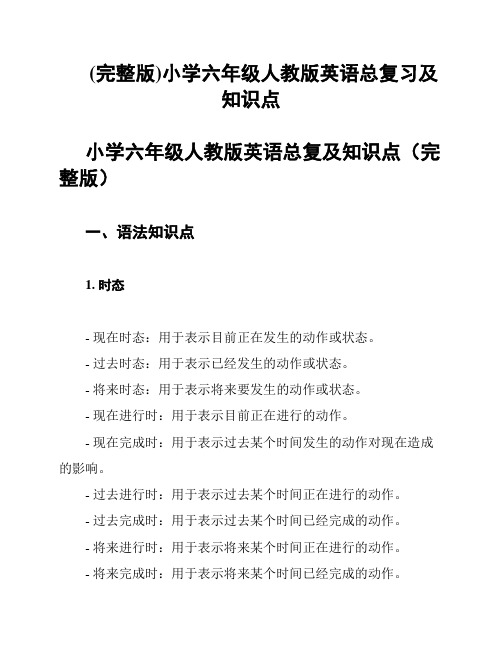
(完整版)小学六年级人教版英语总复习及知识点小学六年级人教版英语总复及知识点(完整版)一、语法知识点1. 时态- 现在时态:用于表示目前正在发生的动作或状态。
- 过去时态:用于表示已经发生的动作或状态。
- 将来时态:用于表示将来要发生的动作或状态。
- 现在进行时:用于表示目前正在进行的动作。
- 现在完成时:用于表示过去某个时间发生的动作对现在造成的影响。
- 过去进行时:用于表示过去某个时间正在进行的动作。
- 过去完成时:用于表示过去某个时间已经完成的动作。
- 将来进行时:用于表示将来某个时间正在进行的动作。
- 将来完成时:用于表示将来某个时间已经完成的动作。
2. 语法结构- 名词:用于表示人、动物、物体、地点等。
- 动词:用于表示动作或状态。
- 形容词:用于描述名词的特征或状态。
- 副词:用于修饰动词、形容词或其他副词。
- 介词:用于表示位置、时间或关系等。
- 代词:用于替代名词。
- 数词:用于表示数量。
- 冠词:用于限定名词的范围。
- 连词:用于连接词语、短语或句子。
3. 句子结构- 主语:句子中执行动作或承受动作的人或事物。
- 谓语:句子中说明主语动作或状态的部分。
- 宾语:句子中接受动作的人或事物。
- 定语:用于修饰名词或代词的成分。
- 状语:用于修饰动词、形容词、副词或整个句子的成分。
- 表语:用于说明主语的状态或特征的部分。
二、总复内容1. 单词- 请根据教材中的单词表,复并牢记相关的单词拼写和意思。
2. 句子- 复教材中的对话和句子,理解并掌握其基本意思和用法。
3. 对话- 复教材中的对话,掌握其中的日常生活用语和表达方式。
4. 语法- 复教材中的语法知识点,加深对时态、语法结构和句子成分的理解。
三、研究方法1. 多听多说- 多听英语教材、歌曲或英语广播,提高听力水平。
- 多说英语,练口语表达和语音准确性。
2. 多读多写- 多读英语教材、故事书等,提高阅读理解能力。
- 多写英语作文,锻炼自己的写作能力和语法运用。
人教版英语六年级下册知识点总结
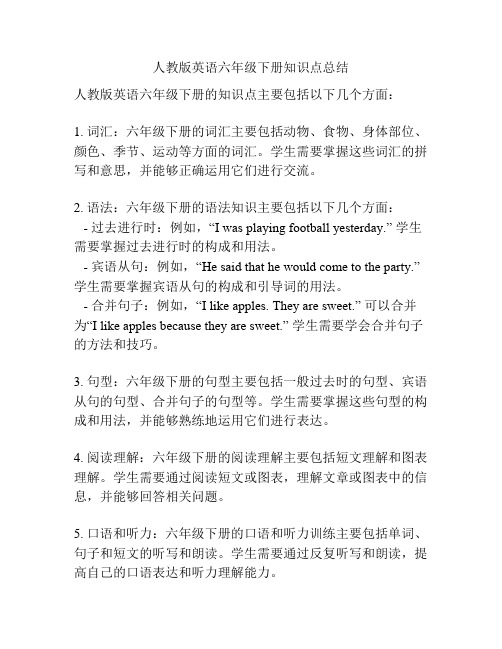
人教版英语六年级下册知识点总结
人教版英语六年级下册的知识点主要包括以下几个方面:
1. 词汇:六年级下册的词汇主要包括动物、食物、身体部位、颜色、季节、运动等方面的词汇。
学生需要掌握这些词汇的拼写和意思,并能够正确运用它们进行交流。
2. 语法:六年级下册的语法知识主要包括以下几个方面:
- 过去进行时:例如,“I was playing football yesterday.” 学生需要掌握过去进行时的构成和用法。
- 宾语从句:例如,“He said that he would come to the party.” 学生需要掌握宾语从句的构成和引导词的用法。
- 合并句子:例如,“I like apples. They are sweet.” 可以合并为“I like apples because they are sweet.” 学生需要学会合并句子的方法和技巧。
3. 句型:六年级下册的句型主要包括一般过去时的句型、宾语从句的句型、合并句子的句型等。
学生需要掌握这些句型的构成和用法,并能够熟练地运用它们进行表达。
4. 阅读理解:六年级下册的阅读理解主要包括短文理解和图表理解。
学生需要通过阅读短文或图表,理解文章或图表中的信息,并能够回答相关问题。
5. 口语和听力:六年级下册的口语和听力训练主要包括单词、句子和短文的听写和朗读。
学生需要通过反复听写和朗读,提高自己的口语表达和听力理解能力。
总的来说,六年级下册的英语知识点相对来说较为深入和复杂,学生需要花更多的时间和精力来进行学习和巩固。
掌握这些知识点对于提高英语水平和应对六年级下册的考试至关重要。
六年级英文下册复习资料
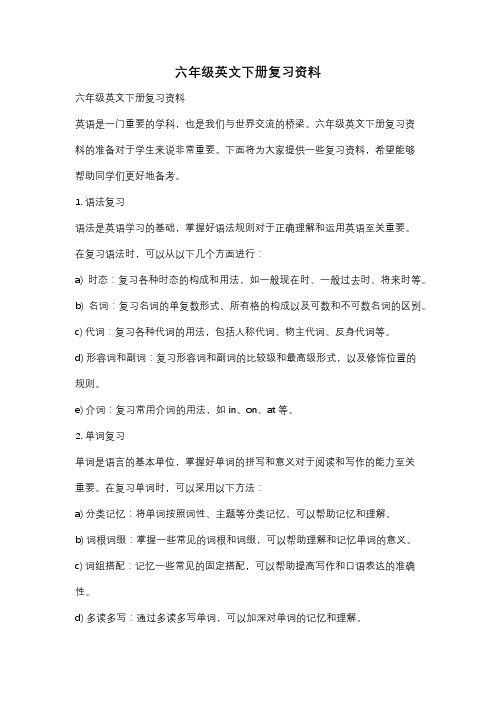
六年级英文下册复习资料六年级英文下册复习资料英语是一门重要的学科,也是我们与世界交流的桥梁。
六年级英文下册复习资料的准备对于学生来说非常重要。
下面将为大家提供一些复习资料,希望能够帮助同学们更好地备考。
1. 语法复习语法是英语学习的基础,掌握好语法规则对于正确理解和运用英语至关重要。
在复习语法时,可以从以下几个方面进行:a) 时态:复习各种时态的构成和用法,如一般现在时、一般过去时、将来时等。
b) 名词:复习名词的单复数形式、所有格的构成以及可数和不可数名词的区别。
c) 代词:复习各种代词的用法,包括人称代词、物主代词、反身代词等。
d) 形容词和副词:复习形容词和副词的比较级和最高级形式,以及修饰位置的规则。
e) 介词:复习常用介词的用法,如in、on、at等。
2. 单词复习单词是语言的基本单位,掌握好单词的拼写和意义对于阅读和写作的能力至关重要。
在复习单词时,可以采用以下方法:a) 分类记忆:将单词按照词性、主题等分类记忆,可以帮助记忆和理解。
b) 词根词缀:掌握一些常见的词根和词缀,可以帮助理解和记忆单词的意义。
c) 词组搭配:记忆一些常见的固定搭配,可以帮助提高写作和口语表达的准确性。
d) 多读多写:通过多读多写单词,可以加深对单词的记忆和理解。
3. 阅读理解阅读理解是考察学生对文章内容理解和推理能力的重要部分。
在复习阅读理解时,可以从以下几个方面进行:a) 主旨理解:抓住文章的主旨和中心思想,帮助理解文章的整体意义。
b) 细节理解:注意细节信息的捕捉和理解,帮助回答具体问题。
c) 推理能力:通过对文章内容的推理,进行判断和推断。
d) 词义猜测:根据上下文的提示,猜测生词的意义。
4. 口语表达口语表达是英语学习的重要组成部分,通过练习口语可以提高听说能力和自信心。
在复习口语表达时,可以从以下几个方面进行:a) 日常交际用语:复习一些常用的日常交际用语,如问候、道歉、感谢等。
b) 对话练习:模拟真实情景进行对话练习,如购物、预订餐厅等。
人教版六年级英语下册复习知识点(通用6篇)
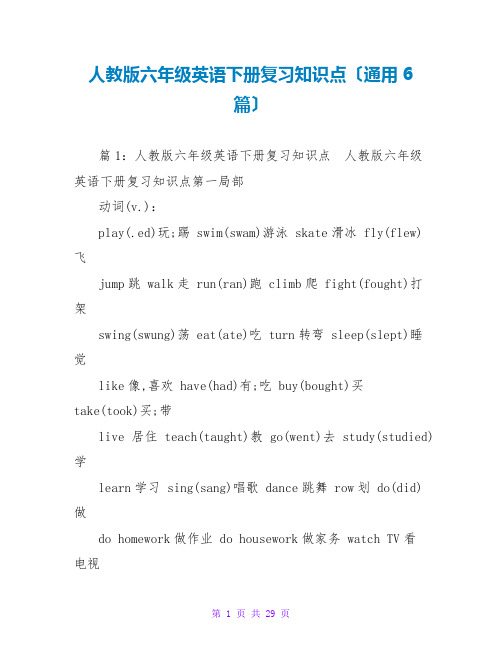
人教版六年级英语下册复习知识点〔通用6篇〕篇1:人教版六年级英语下册复习知识点人教版六年级英语下册复习知识点第一局部动词(v.):play(.ed)玩;踢 swim(swam)游泳 skate滑冰 fly(flew)飞jump跳 walk走 run(ran)跑 climb爬 fight(fought)打架swing(swung)荡 eat(ate)吃 turn转弯 sleep(slept)睡觉like像,喜欢 have(had)有;吃 buy(bought)买take(took)买;带live居住 teach(taught)教 go(went)去 study(studied)学learn学习 sing(sang)唱歌 dance跳舞 row划 do(did)做do homework做作业 do housework做家务 watch TV看电视read(read) books读书 cook the meals做饭ride(rode) a bike骑自行车 play the violin拉小提琴collect sts集邮 meet(met)见面 wele欢送thank谢谢 love爱 work工作 drink(drank)喝 taste尝smell闻 feed(fed)喂养 shear剪 milk挤奶 look看guess猜help帮助 pass传递 show展示 use使用 clean清扫open翻开 close关上 put放 paint绘画 tell(told)告诉kick踢 bounce反弹 ride(rode)骑 stop(stopped)停wait等wash洗 shine照耀 bee变成 feel(felt)感觉到think(thought)考虑 meet(met)遇见 fall(fell)落下leave(left)分开 wake(woke) up醒来 put on穿上take off脱掉 hang up挂起 wear(wore)穿 go home回家go to bed上床睡觉 play puter games玩电脑游戏get off下车 read a magazine读杂志go to the cinema去看电影 go straight向前直走•数词(numbers):one一 two二 three三 four四 five五 six六 seven 七 eight八 nine九 ten十eleven十一 twelve十二 thirteen十三 fourteen十四fifteen十五 sixteen十六 seventeen十七 eighteen十八nieen十九twenty二十 thirty三十 forty四十 fifty五十 sixty 六十 seventy七十 eighty八十 niy九十 forty-two四十二hundred百 one/a hundred and thirty-six一百三十六first第一 second第二 third第三 fourth第四fifth第五 eighth第八 ninth第九 twelfth第十二twentieth第二十thirtieth第三十 fortieth第四十 fiftieth第五十sixtieth第六十 seventieth第七十 eightieth第八十niieth第九十 fifty-sixth第五十六篇2:人教版六年级英语下册复习知识点人教版六年级英语下册复习知识点第二局部1. ---I’m 11 years old. --- I’m 12. I’m one year older than you. 我12岁,比你大一岁。
人教版英语六年级下册知识点总结(一)
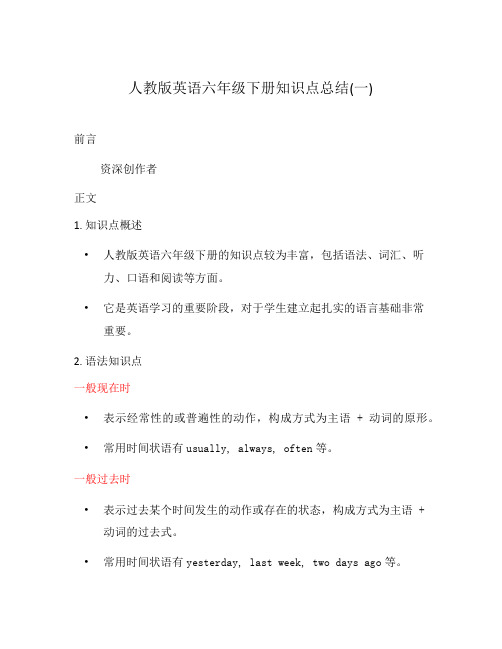
人教版英语六年级下册知识点总结(一)前言资深创作者正文1. 知识点概述•人教版英语六年级下册的知识点较为丰富,包括语法、词汇、听力、口语和阅读等方面。
•它是英语学习的重要阶段,对于学生建立起扎实的语言基础非常重要。
2. 语法知识点一般现在时•表示经常性的或普遍性的动作,构成方式为主语 + 动词的原形。
•常用时间状语有usually, always, often等。
一般过去时•表示过去某个时间发生的动作或存在的状态,构成方式为主语 + 动词的过去式。
•常用时间状语有yesterday, last week, two days ago等。
现在进行时•表示正在进行的动作,构成方式为主语 + be (am/is/are) + 动词的ing形式。
•常用时间状语有now, at the moment, these days等。
3. 词汇知识点•六年级下册的词汇主要涉及日常生活、学校、家庭、节日等方面。
•包括动词、名词、形容词、副词等各类词汇,需要掌握其拼写和用法。
4. 听力知识点•听力部分主要通过听录音来提高学生的听力理解能力。
•包括听对话、听句子、听短文等不同形式的听力练习。
5. 口语知识点•六年级下册的口语重点在于培养学生的口语表达能力。
•学生需要通过大量的口语练习,掌握基本的日常用语和交际用语。
6. 阅读知识点•阅读部分主要通过阅读文章来提高学生的阅读理解能力。
•需要学生掌握基本的阅读技巧,理解文章的主旨和关键信息。
结尾通过对人教版英语六年级下册知识点的总结,我们可以看到它是一个涉及语法、词汇、听力、口语和阅读等多个方面的综合性教材。
掌握这些知识点对于学生来说非常重要,可以帮助他们建立起扎实的英语基础。
同时,学生需要通过不断的练习和运用来巩固所学知识,提高自己的听、说、读、写能力。
希望这份总结对学生们的学习有所帮助。
人教版六年级英语下册复习资料

人教版六年级英语下册复习资料本文档是人教版六年级英语下册的复资料,主要包括以下内容:
一、单词
单词部分旨在让学生能够理解并正确运用课本中出现的单词。
建议学生通过以下途径进行研究:
- 仔细阅读课本中的生词表,注意单词的发音和拼写;
- 多听多说多读多写,增强记忆效果;
- 利用课外时间复单词,例如使用单词卡片、参加线上单词竞
赛等。
二、语法
语法部分主要包括动词时态、数、形容词和副词的比较级和最
高级等内容,通过研究语法使学生能够正确运用英语,避免语法错误。
建议学生:
- 认真理解课本中的语法知识点,弄懂规则和用法;
- 运用口语、书写等多种方式进行练;
- 注意整理错题集,查缺补漏。
三、阅读理解
阅读理解部分通过对课文及相关文章的阅读,让学生提高阅读理解能力。
建议学生:
- 仔细阅读课文及相关文章,理解其中的含义;
- 总结文章中的重点,如人物、事件等;
- 练阅读理解题目,提高解题能力。
四、听力
听力部分旨在让学生提高听力理解能力,建议学生:
- 多听英语,惯英语语音语调;
- 认真听力材料,理解重点内容;
- 制作听力笔记,加强记忆效果;
- 完成听力练,提高听力水平。
希望学生能够充分利用这份复习资料,更好地提高英语学习效果。
六年级英语人教版下册知识汇总
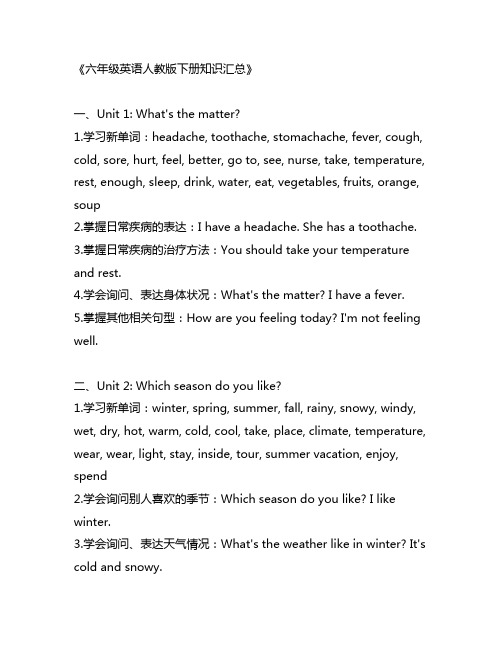
《六年级英语人教版下册知识汇总》一、Unit 1: What's the matter?1.学习新单词:headache, toothache, stomachache, fever, cough, cold, sore, hurt, feel, better, go to, see, nurse, take, temperature, rest, enough, sleep, drink, water, eat, vegetables, fruits, orange, soup2.掌握日常疾病的表达:I have a headache. She has a toothache.3.掌握日常疾病的治疗方法:You should take your temperature and rest.4.学会询问、表达身体状况:What's the matter? I have a fever.5.掌握其他相关句型:How are you feeling today? I'm not feeling well.二、Unit 2: Which season do you like?1.学习新单词:winter, spring, summer, fall, rainy, snowy, windy, wet, dry, hot, warm, cold, cool, take, place, climate, temperature, wear, wear, light, stay, inside, tour, summer vacation, enjoy, spend2.学会询问别人喜欢的季节:Which season do you like? I like winter.3.学会询问、表达天气情况:What's the weather like in winter? It's cold and snowy.4.学会描述喜欢的季节特征:I like summer because it's warm and sunny.5.学会描述自己在某个季节所做的活动:I stay inside and read in winter.三、Unit 3: What are you doing for vacation?1.学习新单词:museum, camping, hiking, zoo, beach, climb, mountain, forest, river, lake, trip, tour, visit, site, decide, activity, prepare, ready, camping, pack, tent,pass, sleeping bag, flashlight, mirror, toothbrush, toothpaste, camera2.学会询问别人在假期做什么:What are you doing for vacation? I'm camping.3.学会描述自己假期的计划:I'm climbing mountains and visiting the zoo.4.学会建议朋友假期活动:You should go hiking and visit the museum.5.掌握相关活动的动词表达:We're visiting a zoo and camping near a river.四、Unit 4: How do you get to school?1.学习新单词:bike, helicopter, skate, walk, bus, subway, train, car, taxi, boat, ship, ferry, ride, fast, foot, wear, seat, belt, important, drive, carefully, happily2.学会询问别人通常怎么上学:How do you get to school? I go to school by bike.3.学会描述自己怎么上学:I walk to school every day.4.学会询问别人怎么去某个地方:How do you get to the zoo? I go by subway.5.掌握相关交通工具的动词表达:I ride a ferry to get to the island五、Unit 5: How much is it?1.学习新单词:shopping, mall, bookstore, drugstore, toy store, shoe store, music store, price, store, sell, money, pay, spend, buy, cheap, expensive, sale, discount, Dollar, Cent, Euro, Pound, Yen, Yuan2.学会询问价格:How much is the T-shirt? It's $ 10.3.学会描述购物体验:I went to the bookstore and bought a book.4.学会询问和表达购物时的价格:The shoes are expensive. I spend $50 on theputer.5.掌握货币表达方式:How much is the dress? It's 100 yuan.六、Unit 6: I'm watching TV.1.学习新单词:play, TV,puter, video, game, chat, with, friend, alone, sometimes, air, outside, talk, on the phone, make, model, ship, airplane, kite, bird, rocket, fly, away2.学会询问别人在做什么:What are you doing? I'm playingputergames.3.学会描述自己正在做的事情:I'm watching TV and chatting with my friend.4.学会表达自己的喜好:I like playing video games and talking on the phone.5.学会表达某些特殊活动:I'm flying a kite in the park.七、Unit 7: What does she look like?1.学习新单词:young, old, have, long, short, curly, straight, blonde, hair, eyes, wear, glasses, big, small, pretty, handsome, tall, short, slim, heavy, dress, skirt, T-shirt, blouse, shirt2.学会询问看起来是什么样子:What does she look like? She is tall and slim.3.学会描述别人的外貌特征:She has long, curly hair and big eyes.4.学会询问和描述服装穿着:What is she wearing? She is wearinga skirt and a T-shirt.5.学会表达自己的外貌特征:I have short, straight hair and small eyes.八、Unit 8: How was your school trip?1.学习新单词:school trip, climb, mountain, wonder, student, teacher, guide, learn, lot, see, different, plant, animal, ground, sun, shine, sky, blue, tree, leaf, same, big, small, much, little2.学会询问和描述学校旅行的情况:How was your school trip? It was wonderful. We climbed a mountain and saw many different plants and animals.3.学会询问和表达在旅行中所见所闻:What did you see on the school trip? We saw a lot of birds and flowers.4.学会表达个人感受:It was a great experience. I learnt a lot during the school trip.5.掌握描述旅行中自然环境的单词和短语:There were many big trees and much sunshine during the school trip.九、Unit 9: When is Easter?1.学习新单词:month, year, holiday, Easter, Christmas, New Year's Day, Spring Festival, Halloween, Thanksgiving Day, Valentine's Day, Mother's Day, Father's Day, holiday, celebrate, on, in, when2.学会询问和表达节日时间:When is Christmas? It's on December 25th.3.学会介绍和讨论节日习俗:We celebrate Thanksgiving Day on the fourth Thursday of November.4.学会描述不同节日习俗:We give presents on Valentine's Day.5.学会对不同节日的预祝:Happy New Year! Happy Mother's Day!结语:以上是六年级英语人教版下册知识的汇总总结,通过对每个单元内容的梳理和归纳,可以更好地帮助学生系统地学习和掌握相关知识,在英语学习过程中取得更好的学习效果。
人教版六年级下册英语重点复习资料
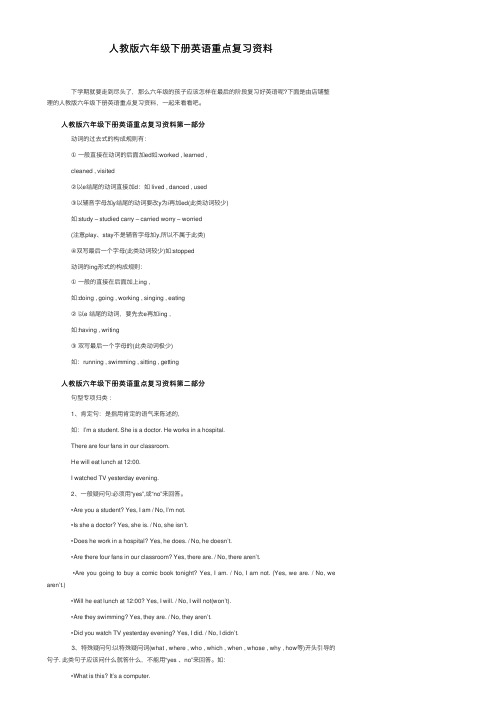
⼈教版六年级下册英语重点复习资料 下学期就要⾛到尽头了,那么六年级的孩⼦应该怎样在最后的阶段复习好英语呢?下⾯是由店铺整理的⼈教版六年级下册英语重点复习资料,⼀起来看看吧。
⼈教版六年级下册英语重点复习资料第⼀部分 动词的过去式的构成规则有: ①⼀般直接在动词的后⾯加ed如:worked , learned , cleaned , visited ②以e结尾的动词直接加d:如 lived , danced , used ③以辅⾳字母加y结尾的动词要改y为i再加ed(此类动词较少) 如:study – studied carry – carried worry – worried (注意play、stay不是辅⾳字母加y,所以不属于此类) ④双写最后⼀个字母(此类动词较少)如:stopped 动词的ing形式的构成规则: ①⼀般的直接在后⾯加上ing , 如:doing , going , working , singing , eating ②以e 结尾的动词,要先去e再加ing , 如:having , writing ③双写最后⼀个字母的(此类动词极少) 如:running , swimming , sitting , getting ⼈教版六年级下册英语重点复习资料第⼆部分 句型专项归类: 1、肯定句:是指⽤肯定的语⽓来陈述的, 如:I’m a student. She is a doctor. He works in a hospital. There are four fans in our classroom. He will eat lunch at 12:00. I watched TV yesterday evening. 2、⼀般疑问句:必须⽤“yes”,或“no”来回答。
•Are you a student? Yes, I am / No, I’m not. •Is she a doctor? Yes, she is. / No, she isn’t. •Does he work in a hospital? Yes, he does. / No, he doesn’t. •Are there four fans in our classroom? Yes, there are. / No, there aren’t. •Are you going to buy a comic book tonight? Yes, I am. / No, I am not. (Yes, we are. / No, we aren’t.) •Will he eat lunch at 12:00? Yes, I will. / No, I will not(won’t). •Are they swimming? Yes, they are. / No, they aren’t. •Did you watch TV yesterday evening? Yes, I did. / No, I didn’t. 3、特殊疑问句:以特殊疑问词(what , where , who , which , when , whose , why , how等)开头引导的句⼦. 此类句⼦应该问什么就答什么,不能⽤“yes 、no”来回答。
- 1、下载文档前请自行甄别文档内容的完整性,平台不提供额外的编辑、内容补充、找答案等附加服务。
- 2、"仅部分预览"的文档,不可在线预览部分如存在完整性等问题,可反馈申请退款(可完整预览的文档不适用该条件!)。
- 3、如文档侵犯您的权益,请联系客服反馈,我们会尽快为您处理(人工客服工作时间:9:00-18:30)。
六年级英语2013复习材料--- 看图回答问题:
1. Where were you yesterday? I was _______ the _______.
at bookshop/bookstore
2. Where were you born ?
I _______ _______ in Tianjin.
was born
3. What did Bingxin write for children? She _______ _______ for children.
wrote stories/books
4. What did Peking Man eat?
He ____ plants and ________.
ate meat
5. When did you plant trees?
I planted trees on __________ __________ Day.
Tree Planting
6. Did he draw pictures on the wall? _______, he _______. Yes did
Did he draw pictures on the wall? _______, he _______.
No didn ’t
7. What’s in front of the building?
_______ are many _______ in front of the building. There trees
8. Excuse me, how can I get to the City Library? You can go there _______ _______.
by bus
9. How will they go to Qingdao?
They will _______ a _______ there.
take train
10. Where are you going to visit this morning?
We’re going to visit the _______ _______ this morning.
Great Wall
11. Where would you like to go?
I would _______ to go to _______.
like London/Britain
12. Who are our friends?
These _______ ________ our friends.
animals are
13. What bad things do we do to our planet?
We _______ too much _______.
waste water
14. What should we do to our planet? We should _______ things made of _______.
use paper
15. How did you learn?
I _______ a lot from our _______.
learned textbooks
16. What can you do? I can _______ _______.
take photos
17. What can you do?
I can _______ _______. make toys。
